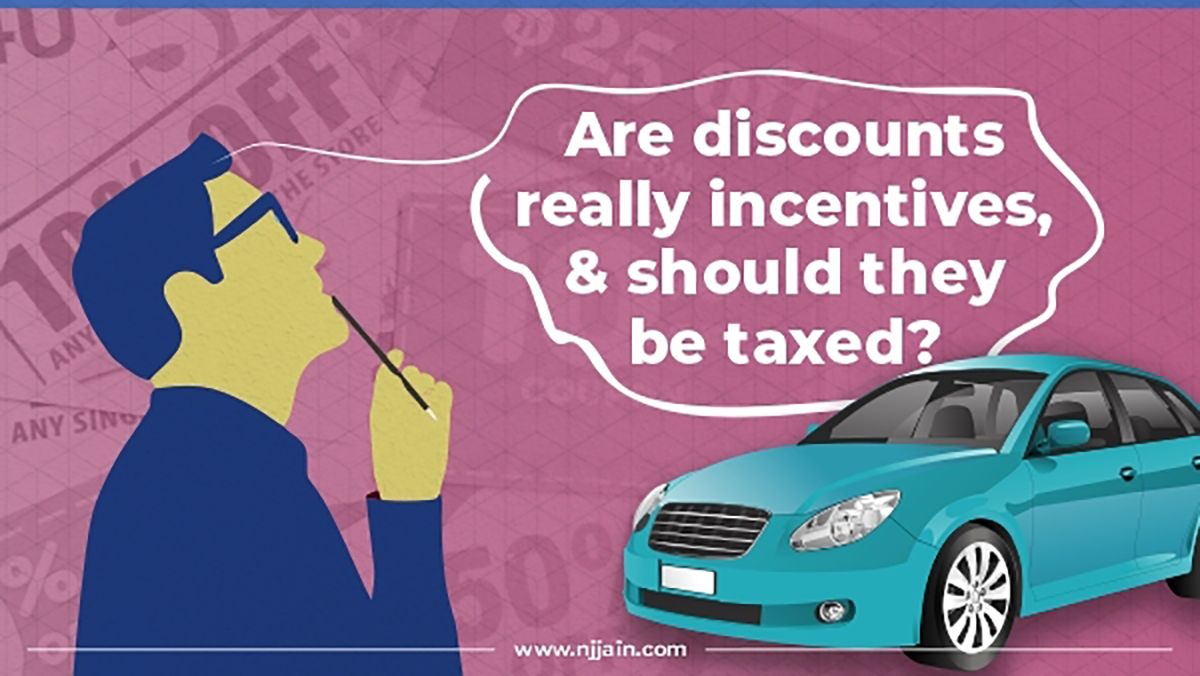
As one might experience, big Car manufacturers (popular known as Original Equipment Manufacturer – OEM) often come out with special discounts and offers that provide buyers with a considerable concession on the products. These are due to the trade incentives (discounts)that manufacturers offer to a car dealer to incentivize sales on special occasions and festivals.
For example, if a car is billed at Rs. 10 Lakhs by OEM to a dealer, neither the dealer nor OEM is aware of the future discount that could be offered on the product. When the car is actually put out to be sold, OEMs roll out schemes, like Diwali special discount, Holi offer, a corporate offer, etc., which are fancifully termed as ‘incentives.’ Based on these offers, dealers extend discounts to ultimate customers which are later on reimbursed back to the dealer by the OEM.
While these incentives, a.k.a. discounts, are clearly meant to increase sales and are often introduced to help car dealers establish a good base, but the department has tried to takes its pound of flesh and is trying to levy it with service tax by issuing demand notices left right and centre.
So, the question that begs an answer is that are these discounts, labeled as incentives, taxable under Service tax law?
Ideally, these incentives should be categorized under trade discounts, but the Service Tax Department treats it as a service. Service Tax Department saw that such transactions are neither levied with excise duty or VAT, and they deemed such incentives as services and made them taxable.
Numerous taxpayers filed appeals against such demands to Customs Excise and Service Tax Appellate Tribunal (CESTAT), and in all those judgments, CESTAT has unequivocally ruled in favour of taxpayers, stating that such discounts are not liable to service tax.
Post introduction of Negative list based Service tax regime in 2012, Service Tax department renewed their demand on these trade discounts and started issuing demand notices. Departments across India have ignored the submissions of taxpayers completely and merely done an exercise in Arithmetic whereby they took the entire incentive amount and charged service tax on the full amount without going into merits of the transaction or past case laws.
As bizarre as this treatment is, the tax department does not have a specific explanation of why such discounts are considered as services. Even the show-cause notices on tax arrears do not specify the service element in such transactions and why a specific charge has been levied. One of the most perplexing aspects about this is that when a discount is stated to be liable for deduction under Section 15 of the CGST Act, how can it be a service in the service tax regime?
Under the GST regime, these discounts are disbursed under the cover of financial/commercial credit notes, which are allowed, and ITC on full value is also allowed. But, even then, car dealers have been facing problems with such issues under service tax.
We faced a similar situation when we were handling a case for one of our clients, Talwar Mobiles (Hyundai Dealer), based in Hyderabad. Commissioner understood our point of view, appreciated our argument, and gave a reasoned order where he categorically mentioned that these incentives do not have any service element and hence are not taxable under the service tax regime.
Similarly, even the Baroda Commissioner Appeals has supported this argument and has helped us provide justice to our clients. More and more tribunals are realizing that the taxes on discounts are baseless and such adjudications are contributing towards improving the tax system.
Hence, we urge all our clients and friends in the car dealers community to represent and fight their cases well at all legal forums and not succumb to the pressure.
